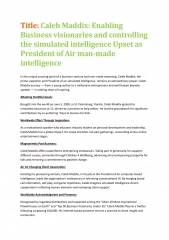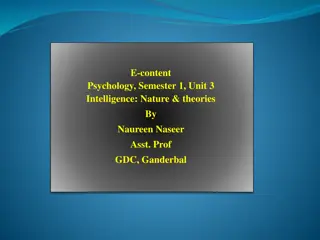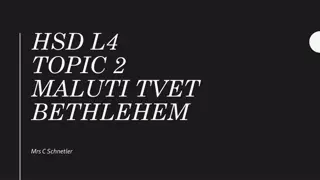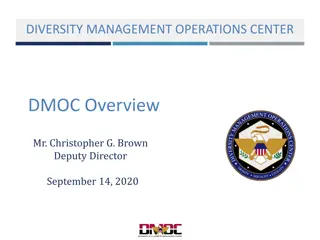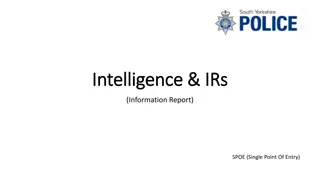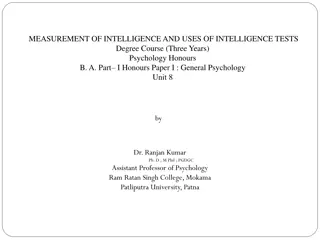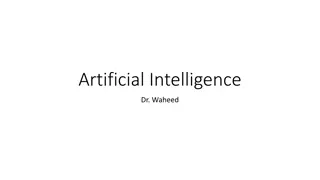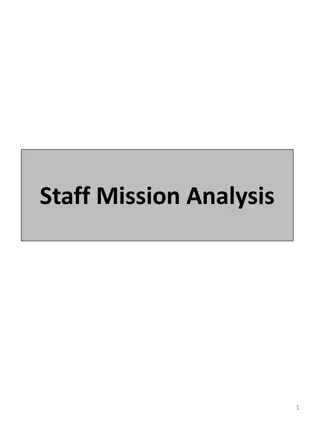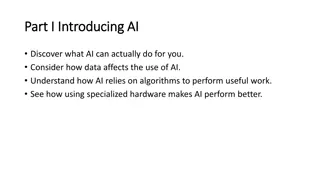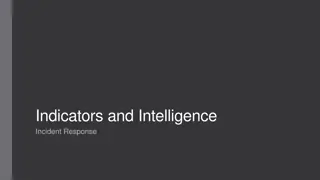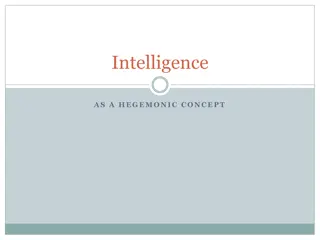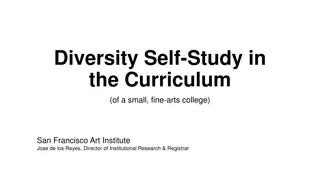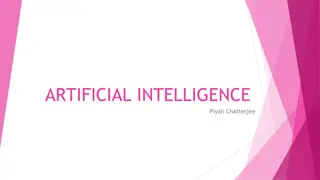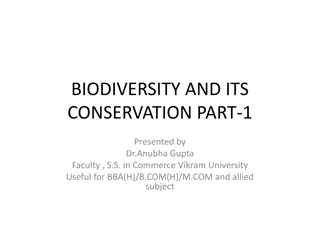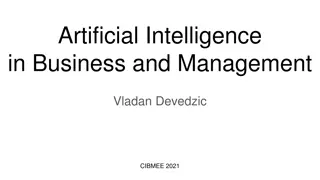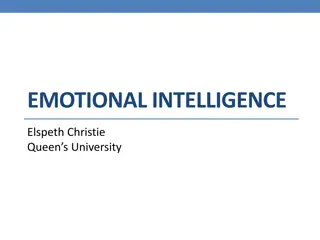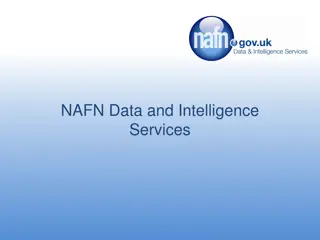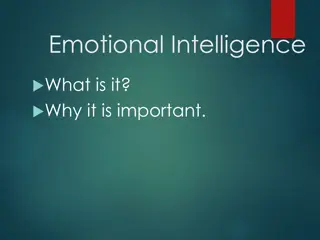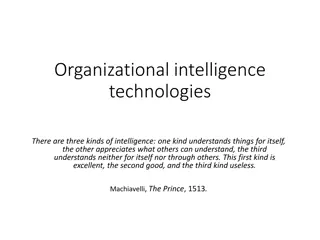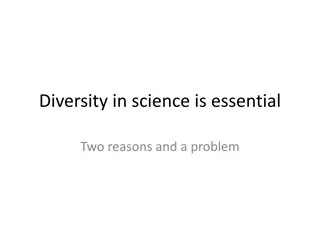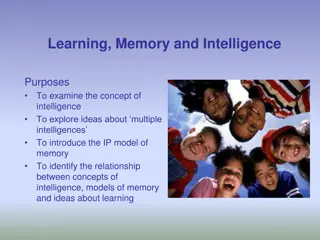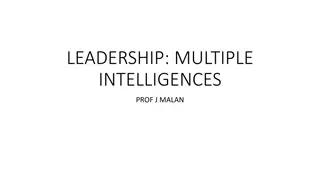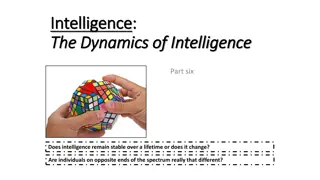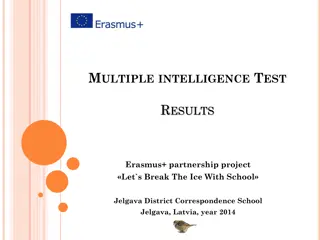Caleb Maddix: Graphing the simulated intelligence Wilderness and Moving Business
Find Caleb Maddix's rousing process from youthful creator to Leader of Air artificial intelligence. His influence is global as a pioneer in entrepreneurship and artificial intelligence. Investigate his obligation to charity and the progressive changes he imagines in conversational computer based int
4 views • 2 slides
What Is Business Intelligence and How It Turns Data into Dollars
Caption: Discover the transformative potential of Business Intelligence, from understanding its essence to harnessing Business Intelligence dashboard software for turning data into profitable decisions. Explore how this analytical tool revolutionizes data utilization for financial growth and learn w
3 views • 4 slides
Understanding Supplier Diversity: Grange Enterprise Program
Supplier Diversity is a proactive program at Grange Enterprise that encourages minority-owned businesses to participate in sourcing. This initiative, managed by Enterprise Strategic Sourcing, aims to promote diverse suppliers such as Black, Hispanic, women, veterans, LGBT, and non-Caucasian male-own
1 views • 6 slides
Artificial Intelligence Courses Online | Artificial Intelligence Training
AI Online Training - Visualpath provides top-quality Artificial Intelligence Training conducted by real-time experts. Our training is available worldwide, and we offer daily recordings and presentations for reference. Call us at 91-9989971070 for a free demo.\nWhatsApp: \/\/ \/catalog\/919989971070
1 views • 11 slides
Theories of Intelligence: Monarchie vs. Spearman's Two-Factor Theory
The Monarchie Theory of Intelligence posits a single factor of intelligence, while Spearman's Two-Factor Theory divides intelligence into a general ability (G-factor) and specific abilities (S-factors). The implications of these theories on educational practices are discussed, shedding light on the
11 views • 25 slides
Reforming Intelligence Laws for Effective Oversight and Accountability
Urgent completion of the National Security Strategy and architectural review is crucial before amending intelligence laws. The establishment of a dedicated Ministry of Intelligence, clarification of definitions, and enhancing oversight mechanisms are recommended to address gaps and improve the intel
0 views • 10 slides
Understanding Intelligence: Theories and Types Explored
Intelligence is the global capacity to comprehend the world, think logically, and utilize resources effectively. This content delves into the nature of intelligence, explaining intelligent behavior and discussing different types of intelligence such as verbal comprehension, spatial visualization, an
0 views • 13 slides
Understanding Intelligence: IQ and Emotional Intelligence in Education
The concept of intelligence is explored through IQ testing and emotional intelligence in education. IQ, based on cognitive abilities, helps in assessing academic potential and identifying learning barriers, while emotional intelligence (EQ) plays a crucial role in understanding and managing emotions
1 views • 13 slides
DIVERSITY MANAGEMENT OPERATIONS CENTER Overview
The Diversity Management Operations Center (DMOC) is committed to achieving DoD mission success through promoting a culture of inclusion and diversity. Led by Deputy Director Mr. Christopher G. Brown, the DMOC executes diversity management programs, focuses on EEO investigations and resolutions, con
2 views • 11 slides
Overview of Intelligence Testing in Psychology: Insights and Perspectives
Delve into the fascinating realm of intelligence testing as explored by Dr. Ranjan Kumar, covering the significance of IQ tests, the concept of intelligence, historical perspectives on intelligence measurement, and key figures like Alfred Binet and David Wechsler. Gain insights into the evolution of
2 views • 52 slides
Way Forward on Transparent Tx Diversity in 3GPP.TSG-RAN.WG4#94-e-Bis Meeting R4-2005652
The meeting discusses the implementation of transparent Tx Diversity for uplink full power transmission in the context of 3GPP specifications for FR1 in Release 16 and beyond. It outlines the necessary changes needed to allow UE behavior of transparent Tx Diversity, test case adaptations, power scal
1 views • 11 slides
Understanding Intelligence Reporting and Assessment in Policing
Intelligence plays a crucial role in police decision-making by providing evaluated information. This report outlines the National Intelligence Model, criteria for assessing intelligence relevance, accuracy, and value, as well as guidelines for information submission in law enforcement settings. It e
0 views • 8 slides
Understanding Intelligence and Intelligence Testing: A Psychological Perspective
Explore the concept of intelligence, its measurement, and classical theories through the lens of psychology. Learn about the different perspectives and factors that shape our understanding of intelligence.
1 views • 60 slides
Understanding Emotional Intelligence in the Workplace
Explore the significance of emotional intelligence in the workplace, its definition, five competencies, case studies, and strategies to enhance skills. Dive into scenarios, role-plays, misconceptions, and why emotional intelligence is crucial for professional success. Learn about managing emotions,
0 views • 33 slides
Unlocking the Power of Diversity in the Workplace
Discover the significance of valuing diversity in the workplace through the University of Texas Employee Assistance Program's insightful presentation. Learn about the impact of diversity, its benefits, and strategies to leverage differences for improved teamwork, productivity, and overall results. E
0 views • 28 slides
Understanding Artificial Intelligence and Intelligence in Computers
Artificial Intelligence (AI) aims to create intelligent computer systems that mimic human behaviors. It involves algorithms derived from human intelligence to make computers smarter and more useful. This includes the ability to acquire knowledge, think, reason, and exhibit goal-oriented behavior. Th
0 views • 13 slides
Staff Mission and Intelligence Analysis Overview
Intelligence and staff roles within an organization are crucial for operational success. The Intelligence ACOS is responsible for providing intelligence support to operations, while the Staff Weather Officer coordinates weather services through the G-2 (S-2). The Movement and Maneuver ACOS, S/G-3, f
0 views • 34 slides
Understanding Emotional Intelligence: Key Principles and Skills
Emotional intelligence, as presented by David Taylor, is crucial in perceiving, understanding, and managing emotions in oneself and others. It plays a vital role in professional and personal relationships by enhancing emotional awareness, recognition, and management. The principles of emotional inte
1 views • 22 slides
Understanding Artificial Intelligence: A Comprehensive Overview
Explore the realm of Artificial Intelligence (AI) through its definitions, historical context, and practical applications. Delve into the core elements of AI, including discerning intelligence, learning, reasoning, and understanding the role of algorithms and specialized hardware in AI performance.
0 views • 16 slides
Insights into Theories and Definitions of Intelligence
Various psychologists throughout history have defined intelligence in different ways, highlighting aspects such as judgment, reasoning, adaptation, problem-solving, and overall mental capacity. From Binet to Gardner, each perspective sheds light on the diverse facets of intelligence, emphasizing the
3 views • 52 slides
Enhancing Incident Response Through Threat Intelligence
Explore the importance of threat intelligence in incident response, covering aspects such as understanding adversaries, assessing risks, evaluating threats, and leveraging strategic intelligence. Learn how organizations can benefit from a proactive approach to cybersecurity by utilizing threat intel
1 views • 18 slides
Unpacking the Notions of Intelligence and Social Hegemony
This presentation delves into the complex concepts of intelligence and social hegemony, exploring historical perspectives, scholarly debates, and folk beliefs. It challenges the hegemonic nature of contemporary intelligence definitions and examines the power dynamics within civil society. Through a
1 views • 14 slides
Diversity Self-Study in the Curriculum of a Small Fine Arts College
San Francisco Art Institute conducted a diversity self-study in 2015-16 to address concerns about diversity and inclusivity in the curriculum. The study aimed to align with the college's Diversity Statement and Institutional Learning Outcomes, utilize assessment tools, and promote diversity, equity,
0 views • 35 slides
Understanding Different Types of Artificial Intelligence
Artificial Intelligence is categorized into Narrow AI (Weak AI), General AI, and Super AI based on capabilities, while Reactive Machines, Limited Memory, Theory of Mind, and Self-Awareness are types based on functionality. Each type serves a specific purpose with varying levels of intelligence. Narr
0 views • 27 slides
Building Diversity in PRSSA Chapters: A Comprehensive Approach
This content showcases how a PRSSA chapter focused on diversity and inclusion by adding a Diversity and Inclusion Director to their eboard, recruiting students from various schools, engaging with high school students, collaborating with PR firms, and partnering with the school's diversity and inclus
0 views • 12 slides
Understanding Biodiversity and Conservation
Biodiversity refers to the variety of living organisms and ecosystems. It includes genetic diversity, species diversity, and ecosystem diversity. Genetic diversity plays a crucial role in adaptation and evolution, while species diversity reflects the richness of different species in a region. Conser
2 views • 11 slides
Understanding Artificial Intelligence: A Comprehensive Overview
Dive into the realm of Artificial Intelligence (AI) to explore the concept of intelligence, the history of AI, success stories, examples, the capabilities of AI systems, the Turing test, and the various components involved in intelligence. Discover the disciplines that contribute to the development
0 views • 24 slides
Understanding Artificial Intelligence in Business and Management
Examples of AI applications in business and management include AI-powered hiring platforms like Humantic AI and Apploi, specialized in recruiting healthcare professionals. The limitations of AI lie in handling soft skills, as noted by experts. Human intelligence is defined by its ability to create a
0 views • 17 slides
Understanding Emotional Intelligence and its Components
Emotional Intelligence is about identifying, understanding, and managing emotions, recognizing your own needs and those of others, and enhancing interpersonal skills. It involves self-perception, self-expression, and affects decision-making and stress management. People with high emotional intellige
0 views • 20 slides
NAFN Data and Intelligence Services Overview
NAFN Data and Intelligence Services, established in 1996, is a comprehensive hub for data and intelligence solutions, serving around 90% of local authorities. Operating as a not-for-profit organization funded by membership and grants, NAFN offers various services such as credit reporting, authorised
0 views • 16 slides
Importance of Emotional Intelligence in Religious Leadership
Religious leaders benefit greatly from high emotional intelligence, leading to better performance, increased staff retention, and a more positive work environment. Emotional intelligence plays a vital role in pastoral ministry, enhancing emotional care for congregants. Educational programs focusing
0 views • 15 slides
Understanding Emotional Intelligence in the Workplace
Emotional intelligence plays a crucial role in professional success, impacting how we lead teams, handle pressure, and build relationships. This webinar explores the definition of emotional intelligence, its significance in the workplace, and practical ways to enhance it. Discover the key elements o
0 views • 14 slides
Understanding Emotional Intelligence: Definition, Importance, and Examples
Emotional intelligence, a term that originated in the 1960s, refers to the ability to recognize and manage emotions in oneself and others effectively. It involves identifying emotions, understanding their impact, and using this awareness to guide behavior. Emotional intelligence is crucial for perso
0 views • 35 slides
Understanding Organizational Intelligence Technologies
Organizational intelligence technologies involve three kinds of intelligence - understanding independently, appreciating what others can understand, and understanding neither for itself nor through others. This concept emphasizes the importance of collecting, storing, processing, and interpreting da
0 views • 47 slides
Embracing Diversity in Science: Opportunities and Challenges
Diversity is crucial in science for varied perspectives, interpretations, and tools leading to breakthroughs. Future scientists must be drawn from a diverse talent pool. However, there's a problem in underutilizing diverse talent in the scientific workforce. Initiatives like Purdue University's stra
0 views • 23 slides
Insights Into Charlie's Journey: A Tale of Intelligence and Regression
Follow Charlie Gordon's transformative journey as he undergoes an operation to increase his intelligence, leading to unexpected consequences. The story unfolds through diary entries, revealing the impact on his life, relationships, and understanding of intelligence. Themes of humanity, growth, and t
0 views • 16 slides
Exploring Concepts of Intelligence, Memory, and Learning
This presentation delves into the concept of intelligence, explores multiple intelligences, introduces the IP model of memory, and examines the relationship between intelligence concepts, memory models, and learning ideas. It discusses various understandings of intelligence, challenges the fixed int
0 views • 20 slides
Understanding Successful Intelligence in Leadership by Prof. J. Malan
Successful intelligence in leadership involves a balance of analytical, practical, and creative abilities. Fiedler and Link suggest that intelligence predicts leadership success under low-stress conditions, highlighting the interaction between stress, intelligence, and leadership. Leaders must analy
0 views • 33 slides
Understanding the Dynamics and Extremes of Intelligence
Intelligence, as measured by performance on tests, shows stability and predictability from childhood to adulthood. High scoring adolescents often excel in early reading, with scores stabilizing around age 7. The extremes of intelligence manifest in conditions like Intellectual Disability/Development
0 views • 20 slides
Understanding Intelligence Diversity in Students: A Comprehensive Analysis from Erasmus+ Partnership Project
Results from the multiple intelligence test conducted in the Erasmus+ partnership project with Jelgava District Correspondence School in Latvia in 2014 show a diverse range of intelligence types among 271 students. The evaluation reveals a varied mix of logical-mathematical, linguistic, musical, bod
0 views • 5 slides
